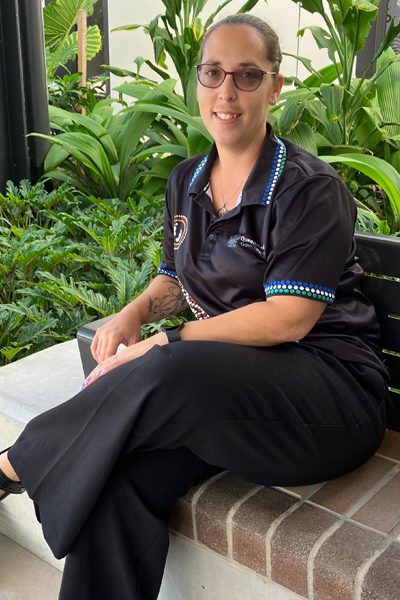Yarning – connecting Aboriginal and Torres Strait Islander communities and improving health outcomes
 Yarning has been an integral part of Aboriginal and Torres Strait Islander cultures for thousands of years, as way to share knowledge, understanding and preservation of culture.
Yarning has been an integral part of Aboriginal and Torres Strait Islander cultures for thousands of years, as way to share knowledge, understanding and preservation of culture.
At Metro North Health, yarning tables are included in a culturally appropriate approach to healthcare, providing the opportunity for a social yarn, as well as a safe space for consumers to share their health story and the events that may relate to their present medical condition.
Trina Scott is a Nurse Navigator with the Kallangur Satellite Hospital Aboriginal and Torres Strait Islander Health Service and agrees that yarning provides an easily accessible and culturally safe way for the community to access information and helps improve understanding and use of the healthcare system. Importantly, this information is commonly shared with patients’ families and community.
“Yarning contributes to achieving better health outcomes for the Aboriginal and Torres Strait Islander community. No matter the size of the outcome, the success increases as the knowledge is shared and applied across the community,” said Trina.
As the Community Engagement Officer at the Caboolture Satellite Hospital Aboriginal and Torres Strait Islander Health Service, Stephanie Archibald says that one of the goals of her role is to help consumers feel comfortable and safe when accessing our health services and facilities.
“We work across health boundaries to actively advocate and improve health literacy, in close partnership with patients and families, and other health and allied-health services to improve the patient’s healthcare experience,” said Stephanie.
“Yarning is an important conversation that helps the patient makes sense of this process and gives them a chance to be involved and to feel heard and respected.”
When yarning is used in healthcare it is a two-way dialogue of sharing and receiving information. It’s built on a process where relationships and trust within the community are built overtime. It’s also respectful of cultural protocols as well as an awareness of what each person wants to get out of the dialogue.
According to Caboolture Hospital Aboriginal and Torres Strait Islander Health Services Manager Tracy Grant, creating yarning opportunities was an important part of community engagement in the lead-up to the opening of the Caboolture and Kallangur Bribie Island Satellite Hospitals. Conversations have now begun on Bribie Island with a yarning table held in March 2024, and one planned for Friday 31 May 2024.
“Our first yarning table was a successful introduction on the island, and the beginning of a journey to connect with the community, with people coming to a safe space to yarn,” said Tracy.
“There is a lot of information to share about the Bribie Island Satellite Hospital services. Yarning tables provide the opportunity to talk with the community about their personal experience of healthcare, and to understand what health care means to them and how we can make it better in the future.”
Caboolture and Kilcoy Hospitals and Woodford Health Service Executive Director Karlene Willcocks says yarning tables open participation opportunities to health consumers, carers and community members who may not ordinarily participate in healthcare consultations, providing a safe and supportive environment.
“Conventional healthcare systems can be daunting at the best of times. Yarning tables are an important strategy in helping us ensure our services are accessible and acceptable to our community helping to address some of the health inequities faced by Aboriginal and Torres Strait Islander communities,” said Karlene.
To find out more about the Bribie Island Satellite Hospital and upcoming community engagement events and yarning tables, visit metronorth.health.qld.gov.au/hospitals-services/satellite-hospitals.
